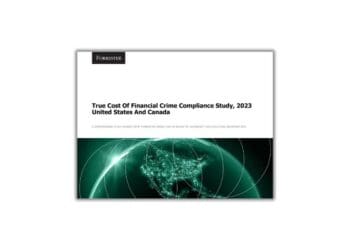A 2021 investigation found that more than four dozen universities in the UK had accepted millions of pounds in direct cash payments from students in countries where financial crime is common; despite this, more recent research reveals that higher ed in the UK is still unequipped to handle its money laundering risk. Simon Luke of FirstAML explores the subject and what makes education a particularly choice target.
Editor’s note: This article’s author, Simon Luke, is UK country manager at FirstAML, an AML software provider.
It’s well-known that the property and banking sectors are vulnerable to money laundering. But it may come as more of a surprise that higher education in the UK is also a prime target for criminals. It’s easy to see why: in 2021, a Times investigation found that nearly 50 UK universities had accepted upwards of £52 million in direct cash payments for tuition and fees from students hailing from countries known to be at high risk for financial crime.
Universities are a target of choice because of the ease with which dirty money can be cleaned by entering the legitimate financial system. Now, joint research by Cardiff University, the University of the West of England and the University of Reading has shown that a fifth of UK universities that responded to a freedom of information request still accept cash for tuition fees and accommodation, with some not imposing any limit on the amount that can be paid.
The same study concludes that higher education institutions (HEIs) are increasingly vulnerable due to not explicitly falling within the parameters of UK anti-money laundering (AML) regulations. Clearly, more specific legislation is needed to close these loopholes as soon as possible. Alongside that, education professionals must have better access to improved and consistent training when it comes to fighting financial crime.
Current regulations missing the mark
The gap in regulations sits at odds with many other sectors. As the UK’s tax, payments and customs authority, HRMC, outlines, money laundering “regulations apply to a number of different business sectors, including accountants, financial service businesses, estate agents and solicitors,” while “every business covered by the regulations must be monitored by a supervisory authority.” These are sectors generally at high risk of money laundering. But HEIs are a notable absence from the list.
They are, however, still subject to the Proceeds of Crimes Act 2002 (POCA). Under this law, higher ed institutions are required to report anyone they suspect of using illicit funds, or else face prosecution. Even so, HEIs are given little guidance in how to practically implement these rules.
This means that despite the moral, ethical and financial implications that could arise from not conducting proper due diligence, as Henry Hillman, lecturer at Reading’s law school, stated, under current regulations “universities were not obliged to implement counter-measures.” This is leading to a range of responses, with universities adopting different approaches to tackling suspicious activity, or consistently not acting on it.
As the study brings to light, the majority of HEIs “do not submit suspicious activity reports (SARs) to the authorities,” despite guidelines requiring them to do so. The problem is these institutions are dealing with general guidelines and nothing specific to the use cases they will come across. So, by not being directly included under UK AML regulations, there is much room for disparity and misalignment in how AML protections are implemented.
Consistently improved education for professionals and students
Alarmingly, despite the continuing acceptance of cash, a lack of awareness and inconsistent enforcement in HEIs presents opportunities for criminals to exploit. The same joint study found that 20% of higher ed respondents do not currently offer any internal AML training for staff. Additionally, 24% of respondents do not provide any guidance to their students on the risks posed to them by organized crime.
So, for a fifth of universities, staff are ill-equipped in knowing how to spot money laundering, red flags or how to report any suspicious activity. Students may also unwittingly or knowingly be the subjects of money laundering activity, unaware of what is happening, unable to spot the dangers or groomed into the activity. This all points to a need to deliver improved, consistent education for both staff and students.
Just as perilous is HEIs knowing it is happening but unable to deal with or report any cases due to a lack of compliance protocols in place. Not only can this result in some hefty fines, but it can also leave lasting reputational damage. Interestingly, some parts of a university may fall under UK AML regulations if that business runs a high risk of money laundering. But there is no point in some areas adhering to rules while other departments operate from a different rule book.
So, the most important step universities can take is to create a consistent AML process and culture of compliance. This can then be scaled across the institution, streamlined and facilitated by implementing AML technology.
War and the Changing Face of Financial Crime
Addressing London’s soft touch on dirty money
Read moreTech can share the load of AML, if joined by cultural change
A vital part of the AML process is Know Your Customer (KYC) due diligence. This involves collecting a whole range of information like identity documents, source of funds information and transaction data. A common issue, especially for institutions that are not, or have not, been set up to manage AML, is that these documents can be stored across a variety of locations, sitting in email attachments, download folders or not collected at all.
An AML platform can digitize this compliance process and allows staff to have all of this data in an easily accessible and central location. The process can then be democratized across a university, with compliance professionals able to check students’ identity documentation, set alerts for red flags and forward any SARs to auditors.
However, none of this works without cultural, structural and practical changes. Tech can help deliver all of these things, but measures have to be implemented from the top. A clear and obvious starting point, for instance, would be to make large cash payments redundant.
Passing with flying colors
While it may initially come as a surprise, the study’s revelation that many HEIs are still accepting large cash sums makes the idea of prolific money laundering in the sector much less shocking. But technically these institutions are not breaking any rules. This simply highlights the need for an urgent revision of UK AML regulations to specifically include and guide HEIs.
With a change in regulation needs to come a change in training and awareness, with a consistent approach to AML established across HEIs. In the modern age, technology is a must and can act as a trigger for this change. But HEIs must make AML an organizational priority. With the right tech, training and culture, rather than fall victim to money laundering tactics, they can pass AML tests with flying colors.




 Simon Luke is UK country manager at First AML. Simon has over 10 years of experience in banking and alternative credit in New Zealand and UK markets. Simon is responsible for First AML UK’s overall market strategy.
Simon Luke is UK country manager at First AML. Simon has over 10 years of experience in banking and alternative credit in New Zealand and UK markets. Simon is responsible for First AML UK’s overall market strategy.







